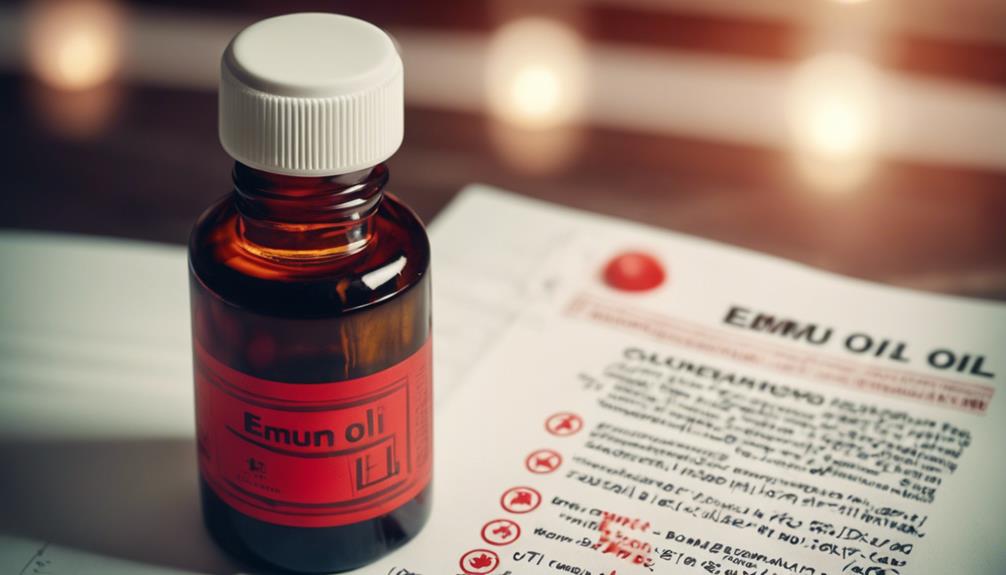
When you think of natural remedies for inflammatory conditions, have you considered the potential benefits of emu oil? This unique oil has been gaining attention for its anti-inflammatory properties and its traditional use by indigenous communities.
As you explore the mechanisms behind its effectiveness, you might find yourself intrigued by the promising results observed in arthritic conditions and eczema.
But what about its safety profile and potential side effects? Stay tuned as we delve deeper into the research studies, consumer experiences, and the future implications of utilizing emu oil for therapeutic purposes.
Key Takeaways
- Emu oil reduces inflammation and provides pain relief in arthritis.
- It effectively soothes dermatitis, eczema, and enhances skin moisture.
- Emu oil aids in joint mobility and overall skin health.
- Clinical trials are needed to validate efficacy and safety for inflammatory conditions.
Origin and Composition of Emu Oil

Have you ever wondered about the origins and chemical makeup of emu oil?
Emu oil is derived from the fat of the emu bird, primarily found in Australia. This oil has gained popularity due to its numerous benefits and therapeutic properties. Emu oil is rich in essential fatty acids, including omega-3, omega-6, and omega-9, which are known for their anti-inflammatory properties. These fatty acids play a crucial role in reducing inflammation in the body, making emu oil a valuable natural remedy for various inflammatory conditions.
Moreover, emu oil is a potent antioxidant, containing compounds like vitamin E, which help protect the skin from free radical damage and promote overall skin health. The oil also has excellent moisturizing properties, making it beneficial for dry and sensitive skin. Its ability to deeply penetrate the skin allows for quick absorption and provides long-lasting hydration.
Historical Use in Indigenous Cultures
The historical use of emu oil in Indigenous cultures dates back centuries, showcasing its significance as a traditional remedy with deep-rooted therapeutic value. Emu oil holds cultural significance among Indigenous communities, playing a vital role in their healing traditions and practices. The rich history of emu oil reveals its integral place in Indigenous remedies, where it was utilized for various ailments and as a natural therapy for skin conditions, wounds, and joint pains. This natural substance was revered for its versatility and effectiveness in addressing a wide range of health concerns, reflecting the deep connection Indigenous cultures had with nature and their profound knowledge of traditional medicine.
Emu oil was traditionally used in ceremonies and rituals, symbolizing healing and spiritual cleansing. Indigenous elders passed down knowledge of emu oil extraction and application techniques through oral traditions. The practice of using emu oil in Indigenous cultures underscores the belief in the holistic healing power of nature's gifts.
Anti-Inflammatory Mechanisms

Emu oil demonstrates potent anti-inflammatory properties through its unique composition of fatty acids and bioactive compounds. The mechanisms underlying its effectiveness in reducing inflammation have been the focus of various studies and clinical trials. Research suggests that emu oil contains high levels of omega-3, omega-6 fatty acids, and antioxidants, which contribute to its anti-inflammatory effects. These components work synergistically to modulate inflammatory pathways in the body, such as reducing the production of pro-inflammatory cytokines and promoting the synthesis of anti-inflammatory molecules.
Clinical trials evaluating the anti-inflammatory outcomes of emu oil have shown promising results. For instance, topical application of emu oil has been found to alleviate symptoms of inflammatory skin conditions like dermatitis and eczema. Additionally, oral supplementation with emu oil has demonstrated benefits in reducing inflammation in conditions such as arthritis. The diverse ways in which emu oil can target inflammation make it a promising natural remedy for various inflammatory conditions.
Effects on Arthritic Conditions
With its proven efficacy in reducing inflammation, emu oil has garnered attention for its potential effects on arthritic conditions. Research suggests that emu oil may offer relief for individuals suffering from arthritis by targeting pain and improving joint mobility.
- Pain Relief: Emu oil contains compounds that have been shown to possess analgesic properties, potentially reducing the discomfort associated with arthritic conditions.
- Anti-Inflammatory Effects: By reducing inflammation in the joints, emu oil may help alleviate the swelling and pain experienced by individuals with arthritis.
- Improved Joint Mobility: Some studies indicate that emu oil application could enhance joint flexibility and mobility, leading to better overall function and reduced stiffness in arthritic joints.
These findings highlight the promising role that emu oil may play in managing arthritic conditions. Incorporating emu oil into your arthritis management routine could potentially offer a natural and effective way to address pain and improve joint function.
Eczema Relief Potential

Exploring the potential for relieving eczema, emu oil has shown promise in addressing skin inflammation and enhancing moisture retention. Eczema, a common skin condition characterized by red, itchy rashes, can greatly benefit from emu oil's skin hydration benefits and natural healing properties. Emu oil's ability to deeply penetrate the skin can help soothe the dryness and irritation associated with eczema, promoting overall skin health.
When considering emu oil for eczema relief, it's important to note that while many individuals experience positive results, some may have allergic reactions or sensitivity concerns. Patch testing on a small area of skin before widespread use is recommended to assess individual tolerance and minimize potential adverse reactions.
Despite this, emu oil's natural composition and anti-inflammatory properties make it a compelling option for those seeking relief from eczema symptoms.
Muscle Pain Management
Considering its potential therapeutic benefits, emu oil may offer relief for muscle pain management through its anti-inflammatory properties and deep skin penetration capabilities. When applied topically, emu oil can help reduce muscle inflammation and alleviate discomfort, making it a promising option for individuals seeking natural remedies for muscle pain.
- Heat Therapy: Combining emu oil with heat therapy, such as warm compresses or heating pads, can enhance its effectiveness in relaxing muscles and improving blood circulation.
- Stretching Exercises: Regular stretching routines complemented with emu oil application may aid in reducing muscle stiffness and promoting flexibility, contributing to better pain management.
- Massage Techniques: Massaging emu oil into sore muscles can not only provide direct relief but also potentially enhance the oil's absorption and therapeutic effects.
Emu Oil Vs. Pharmaceutical Options

Emu oil presents a natural alternative to pharmaceutical options for managing inflammatory conditions with its potential anti-inflammatory properties and skin-penetrating abilities. When comparing emu oil to pharmaceuticals, it is essential to consider the benefits of natural remedies and holistic healing approaches. Below is a comparison table outlining some key differences between emu oil and pharmaceutical options:
| Aspect | Emu Oil | Pharmaceutical Options |
|---|---|---|
| Source | Natural product derived from emu fat | Synthetic compounds often created in a lab setting |
| Mode of Action | Anti-inflammatory properties | Target specific pathways in the inflammatory process |
| Side Effects | Generally well-tolerated with minimal side effects | May have a range of side effects depending on the drug |
Emu oil's use aligns with traditional therapies focusing on the body's innate ability to heal. While pharmaceuticals have their place, exploring alternative medicine like emu oil can provide a more holistic approach to managing inflammatory conditions.
Application Methods and Dosage
To effectively utilize emu oil for managing inflammatory conditions, understanding the appropriate application methods and dosage is crucial for achieving optimal therapeutic benefits. Emu oil is known for its skin absorption and effectiveness in reducing inflammation. When considering its application, topical use has shown significant benefits due to direct contact with the affected area, allowing for targeted relief.
Here are some key points to keep in mind:
- Properly Cleanse Skin: Before applying emu oil topically, ensure the skin is clean to maximize absorption and effectiveness.
- Gentle Massage: Gently massaging the oil into the skin can help enhance absorption and facilitate its anti-inflammatory properties.
- Dosage Consideration: While there's no standard dosage for emu oil, start with a small amount and adjust based on the affected area's size and severity of inflammation.
Safety and Side Effects

When exploring the safety and potential side effects of using emu oil for managing inflammatory conditions, it is essential to consider existing research findings and insights from clinical studies. Emu oil is generally well-tolerated when used topically; however, there are some considerations regarding its safety profile. Here is a breakdown of the safety and potential side effects associated with emu oil:
| Safety and Side Effects | Considerations |
|---|---|
| Long term effects | Limited data on prolonged use; monitor for any adverse effects. |
| Efficacy | Varies among individuals; consult a healthcare provider for guidance. |
| Allergic reactions | Rare but possible; perform a patch test before widespread application. |
| Dermatological concerns | May cause minor skin irritation in some users; discontinue use if irritation occurs. |
While emu oil shows promise in managing inflammatory conditions, it is crucial to remain vigilant for any signs of allergic reactions or dermatological issues. Long-term effects and the overall efficacy of emu oil require further investigation to establish a comprehensive understanding of its safety profile.
Research Studies and Findings
Considering the safety and potential side effects of emu oil use, a critical aspect to explore now is the research studies and findings that shed light on its efficacy in managing inflammatory conditions. Clinical trials have shown promising results regarding the effectiveness of emu oil in reducing inflammation in conditions such as arthritis and dermatitis. These studies indicate that emu oil possesses anti-inflammatory properties that can help alleviate symptoms associated with various inflammatory disorders.
- Clinical trials demonstrate the effectiveness of emu oil in reducing inflammation levels.
- Research findings suggest that emu oil may have potential long-term benefits in managing chronic inflammatory conditions.
- Studies also highlight the importance of considering any possible drawbacks or limitations associated with the use of emu oil for inflammatory conditions.
Consumer Experiences and Testimonials

Several consumers have reported positive experiences and provided testimonials regarding the use of emu oil for managing inflammatory conditions. Emu oil's potential benefits extend beyond inflammation, with users praising its efficacy in skin hydration and scar reduction. Below is a table summarizing key consumer testimonials:
| Testimonial | Skin Hydration Experience | Scar Reduction Outcome |
|---|---|---|
| User 1 | Noticed increased skin hydration and smoother texture. | Scar appearance visibly reduced after consistent application. |
| User 2 | Skin felt deeply moisturized and supple. | Scars became lighter and less noticeable over time. |
| User 3 | Experienced improved skin elasticity and softness. | Old scars showed significant fading with regular use. |
| User 4 | Dry patches disappeared, leaving skin well-nourished. | New scars seemed to heal faster and with less visible marks. |
These testimonials suggest that emu oil not only aids in managing inflammatory conditions but also contributes to skin health by enhancing hydration and reducing the visibility of scars.
Future Directions in Emu Oil Research
Building upon the positive consumer experiences and testimonials highlighting the efficacy of emu oil in managing inflammatory conditions and improving skin health, the future directions in emu oil research aim to explore its potential in novel therapeutic applications and mechanisms of action. Researchers are delving into the following aspects to expand our understanding of emu oil:
- Potential Benefits: Investigating the specific bioactive compounds in emu oil that contribute to its anti-inflammatory properties and how they interact with cellular pathways.
- Challenges and Limitations: Addressing concerns regarding the variability in emu oil composition, standardization of extraction methods, and establishing consistent quality control measures.
- Future Prospects: Exploring the possibility of emu oil as a complementary therapy in conditions such as arthritis, eczema, and wound healing, with a focus on clinical trials to validate its efficacy and safety profiles.
These future research endeavors hold promise for unlocking the full therapeutic potential of emu oil while addressing current challenges to optimize its use in various health conditions.
Frequently Asked Questions
Can Emu Oil Be Used in Combination With Other Natural Remedies for Inflammatory Conditions?
Yes, you can combine emu oil with herbal supplements or acupuncture for inflammatory conditions. Emu oil's anti-inflammatory properties complement these natural remedies, potentially enhancing their effectiveness. Consult with your healthcare provider for personalized advice.
What Is the Shelf Life of Emu Oil and How Should It Be Stored?
To maintain the longevity of emu oil, store it in a cool, dark place away from direct sunlight and heat sources. This preservation method ensures the oil's quality over time, offering optimal benefits for your inflammatory conditions.
Are There Any Known Drug Interactions With Emu Oil?
Like a compass guiding a lost traveler, understanding potential allergies or contraindications is crucial when considering drug interactions with Emu oil. Efficacy studies and absorption rates shed light on its impact.
Is Emu Oil Safe for Use on Children or Pregnant Women?
When considering the safety of emu oil for children or pregnant women, it's crucial to consult healthcare providers. While its effectiveness for some conditions is noted, safety concerns and potential risks in pediatric and pregnancy use warrant caution.
Are There Any Potential Environmental Impacts Associated With the Production of Emu Oil?
When considering the environmental impacts of emu oil production, it's essential to evaluate the sustainability of production methods. Emu farming practices should prioritize wildlife conservation to ensure minimal ecological disturbance and long-term environmental health.
Conclusion
In conclusion, the therapeutic potential of emu oil in treating inflammatory conditions is promising. Research studies have shown its anti-inflammatory properties and positive effects on arthritic conditions and eczema. Consumer testimonials also support its efficacy and safety.
As the ancient Indigenous cultures recognized its healing properties, modern research continues to explore its benefits. Emu oil may just be the natural remedy you've been looking for to soothe inflammation and promote overall wellness.




